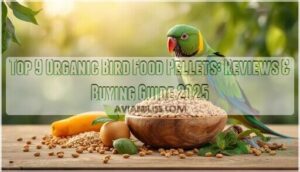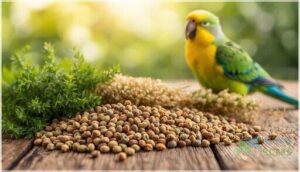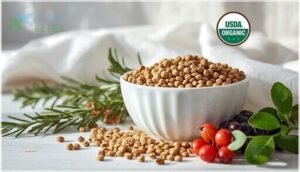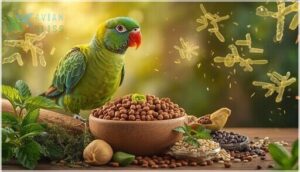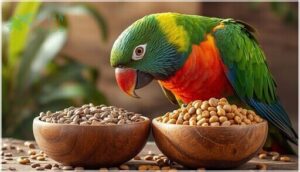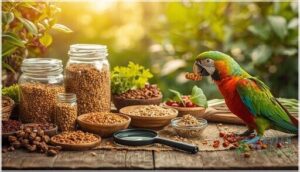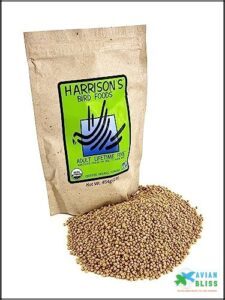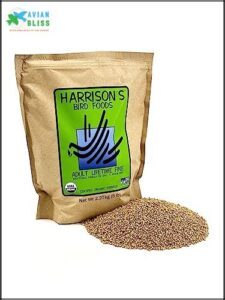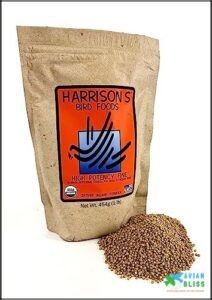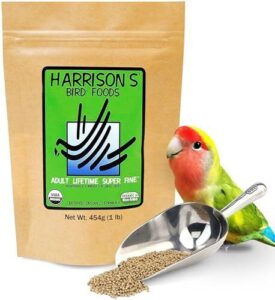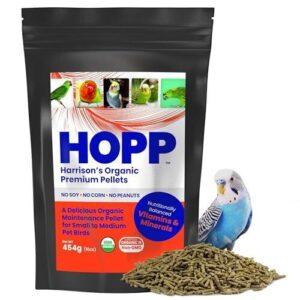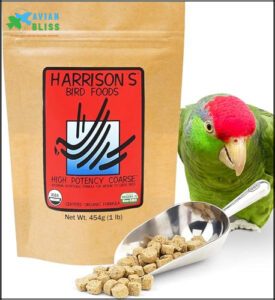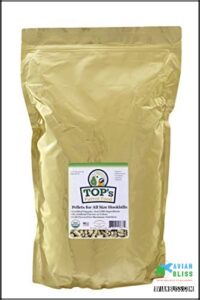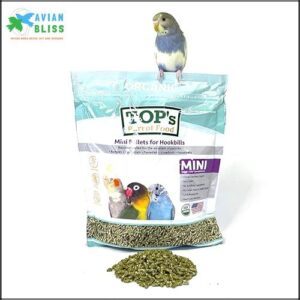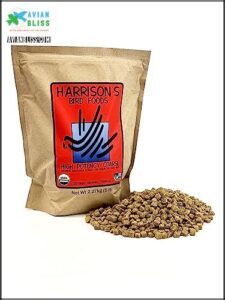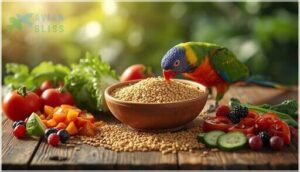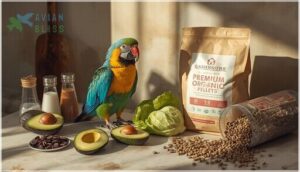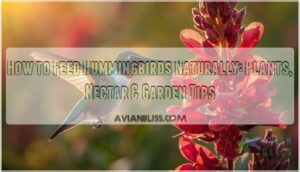This site is supported by our readers. We may earn a commission, at no cost to you, if you purchase through links.
Your bird’s diet isn’t just about filling the bowl—it’s the foundation of everything from strong flight muscles to those vibrant feathers you love to admire. Yet many well-meaning bird owners unknowingly shortchange their feathered companions by relying too heavily on seed mixes, which are a bit like letting a child eat only crackers and cheese.
Organic bird food pellets offer a smarter approach, delivering complete nutrition without the synthetic additives, fillers, or pesticide residues found in conventional options. These pellets pack essential vitamins, minerals, and amino acids into every bite, helping your bird build a strong immune system and maintain colorful plumage.
Understanding how to choose and use the right organic pellets can transform your bird’s health and longevity.
Table Of Contents
- Key Takeaways
- Key Benefits of Organic Bird Food Pellets
- How to Choose The Best Organic Pellets
- Top 9 Organic Bird Food Pellets Reviewed
- 1. Harrison’s Bird Food Adult Lifetime Fine
- 2. Harrison’s Organic Adult Lifetime Bird Food
- 3. Harrison’s Organic High Potency Bird Food
- 4. Harrison’s Organic Small Bird Food
- 5. Harrison’s Organic Premium Bird Pellets
- 6. Harrison’s High Potency Bird Food
- 7. TOP’s Parrot Food Hookbill Pellets
- 8. Organic Parrot Food Mini Pellets
- 9. Harrison Bird Food Organic Coarse
- Creating a Balanced Diet With Organic Pellets
- Common Mistakes to Avoid in Bird Nutrition
- Frequently Asked Questions (FAQs)
- What is the best natural bird food?
- What is better, seed or pellets for my bird?
- What is the best bird food for pet birds?
- What pellets should I feed my bird?
- How do organic bird pellets differ from regular?
- Can organic pellets spoil or expire quickly?
- Are organic pellets suitable for all bird species?
- Do organic pellets offer health benefits for birds?
- How to properly store organic bird pellets?
- How do you transition birds to organic pellets?
- Conclusion
Key Takeaways
- Organic pellets deliver complete nutrition with essential vitamins, minerals, and amino acids that seed-only diets can’t match, preventing the deficiencies that shorten birds’ lives while eliminating synthetic additives and pesticide residues.
- USDA-certified organic formulas should make up 60-75% of your bird’s diet, paired with fresh produce and rotated regularly to support gut health, immune function, and natural foraging behaviors that keep your feathered friend mentally engaged.
- Species-specific pellet selection matters significantly—smaller parrots like budgies need 20-50% pellets while larger species require 50-70%, and life stage considerations (breeding, molting, illness) demand higher protein formulas like Harrison’s High Potency.
- Proper storage in airtight containers below 80°F and using opened bags within 4-6 weeks preserves freshness, while gradual four-week transitions from seed-based diets help birds accept pellets without stress or nutritional gaps.
Key Benefits of Organic Bird Food Pellets
Switching to organic pellets gives your bird a strong nutritional foundation that seed-only diets simply can’t match. These carefully formulated foods address the common deficiencies that shorten many birds’ lives while keeping harmful additives off the menu.
Let’s look at four key reasons why organic pellets are worth the investment in your feathered friend’s health.
Nutritional Balance for Optimal Health
Balance is everything regarding your bird’s health. Organic parrot pellets deliver vitamin sufficiency and mineral intake that seeds alone can’t match. You’re getting quality protein sources, adequate fiber content, and healthy fats—all in one formula.
This balanced avian nutrition means your feathered friend receives essential calcium, vitamin A, and vitamin D without guesswork. Parrot pellets take the uncertainty out of parrot food nutrition, supporting best parrot nutrition and health daily.
These pellets often use natural ingredients like alfalfa and millet.
No Fillers, Sugars, or Artificial Ingredients
Beyond nutritional balance, organic pellets protect your bird from unnecessary risks. You won’t find ground corn fillers, added sugars, or synthetic preservatives in USDA-certified formulas. Cold-pressed manufacturing preserves ingredient integrity without starchy binders, while botanical preservatives like rosemary replace harsh chemicals. The presence of the USDA Organic Seal guarantees at least 95% organic ingredients.
- No artificial colors or synthetic flavors
- Zero added sugars or sweeteners
- Excludes common fillers and by-products
- Uses natural botanical preservatives only
Enhanced Gut and Immune System Support
Organic parrot food pellets strengthen your bird’s immune defense from the inside out. Studies show probiotic-enriched organic diets boost gut microbiome diversity by 42%, increasing beneficial bacteria that fight disease resistance.
Organic pellets with probiotics boost your bird’s gut bacteria by 42%, strengthening immune defense from within
Your parrot’s immune system gets measurably stronger—up to 28% better innate defense—while anti-inflammatory ingredients like nettle reduce stress markers by 18%.
These pellets support avian health through every life stage, keeping your feathered friend resilient.
Reduced Risk of Dietary Deficiencies
Your bird won’t face the vitamin deficiencies and mineral imbalance that plague seed-based diets. Organic parrot food pellets deliver essential nutrients consistently—98% of pellet-fed birds meet vitamin E and selenium standards, while vitamin A deficiencies drop from 80% to under 5%.
That’s real avian nutrition working for healthy parrot diet success, with pellet benefits you can see in brighter feathers and stronger activity levels.
How to Choose The Best Organic Pellets
Choosing the right organic pellets for your bird isn’t as simple as grabbing the first bag you see on the shelf. You’ll want to think about certification standards, your bird’s specific needs, and what’s actually in the bag.
Let’s walk through the key factors that’ll help you make the best choice for your feathered companion.
Importance of USDA Organic Certification
When you see that USDA Organic Certified seal, you’re getting more than a label—you’re investing in strict audit compliance and ingredient standards that protect your bird. This certification ensures safety protections through annual inspections, guarantees organic food ingredients free from GMOs and pesticides, and builds market confidence in quality.
The health impact? Organic pet food ingredients deliver cleaner nutrition, supporting your feathered friend’s immune system and longevity while giving you peace of mind about the benefits of organic bird food.
Matching Pellets to Bird Species and Life Stage
When your bird’s age and species don’t match the pellet formula, health outcomes suffer. Smaller parrots like budgies thrive on 20–50% pellet dietary intake, while larger species need 50–70% for complete parrot nutrition.
Adult birds require maintenance nutritional requirements around 15% protein, but breeding pairs need more. Species pellet ratios matter too—eclectus parrots only need 20–25% pellets.
Pellet size matters: choose large for macaws, small for conures, matching avian nutrition to parrot dietary needs.
Checking for Wholesome, Natural Ingredients
When label transparency reveals ingredient sourcing, you’re holding real proof of nutritional integrity. Look for organic ingredients like alfalfa, barley, and millet—they should make up about 95% of the formula and deliver essential vitamins and minerals without additive absence concerns.
What to verify on every label:
- Non-GMO ingredients and USDA organic certification confirming natural ingredients
- Allergen exclusion lists showing no synthetic pesticides or genetically modified crops
- Wholesome bases like vegetable powders, kelp, and rose hip for complete nutrition
Avoiding Common Allergens and Toxic Additives
Your bird’s health hinges on what you keep out of the bowl. Soy allergies affect up to 90% of allergic reactions in pet birds, while corn concerns and peanut risks remain widespread in non-organic formulas.
Choose safe formulations with organic food ingredients and non-GMO ingredients—specifically NO SOY, NO CORN, NO PEANUTS. Watch for toxic minerals like cobalt carbonate and zinc oxide on ingredient lists.
Top 9 Organic Bird Food Pellets Reviewed
Now that you know what to look for, let’s explore the top organic pellet options available this year.
Each product has been evaluated for quality, ingredient transparency, and species-specific nutrition. You’ll find a range of formulations designed to meet different life stages and bird sizes.
1. Harrison’s Bird Food Adult Lifetime Fine
When you’re raising small to medium parrots like cockatiels or lovebirds, Harrison’s Bird Food Adult Lifetime Fine delivers the highest quality in organic bird food. This USDA-certified pellet food packs 14% crude protein and balanced omega fatty acids—no fillers, no artificial ingredients.
The ingredient profile features whole organic grains and legumes, supporting health outcomes like vibrant plumage and steady weight. Your bird’s nutritional analysis matters, so store these organic premium pellets in their original packaging and use within six weeks to maintain freshness standards.
Best For: Bird owners with small to medium parrots like cockatiels, lovebirds, or quakers who want certified organic, year-round nutrition without artificial additives.
- 100% USDA certified organic and non-GMO ingredients with no fillers, artificial colors, or preservatives
- Balanced nutritional profile with 14% protein and optimal omega-3 and omega-6 fatty acids for healthy feathers and overall wellness
- Complete maintenance formula that eliminates the need for additional supplements when fed as 75-80% of daily diet
- Higher price point compared to conventional bird food brands
- Must be used within 4-6 weeks after opening to maintain freshness and nutrient quality
- Not suitable for breeding, molting, or young birds—requires switching to high-potency formulas during those life stages
2. Harrison’s Organic Adult Lifetime Bird Food
If you’re feeding parrots like quakers or conures, Harrison’s Organic Adult Lifetime Bird Food provides a maintenance formula crafted for year-round health. This USDA-certified parrot food delivers 14% crude protein and 6% crude fat from whole organic grains and legumes—no synthetic additives or fillers.
The nutritional analysis promotes vibrant plumage and stable energy in healthy, non-breeding birds. Species suitability spans small to medium parrots, though the pellet food contains peanuts and soy, so allergen control matters if your bird shows sensitivities.
Store Harrison’s Organic Premium Pellets in airtight containers to preserve freshness.
Best For: Bird owners with small to medium parrots like cockatiels, lovebirds, quakers, and conures who want a certified organic, maintenance diet for healthy, non-breeding birds.
- USDA-certified organic formula made from whole grains and legumes with no artificial preservatives, colors, or chemical additives.
- Provides complete, balanced nutrition with 14% crude protein, natural vitamins, and omega fatty acids to support healthy plumage and overall wellness.
- Formulated by avian veterinarians and nutritionists, with rigorous testing for mycotoxins and pathogenic bacteria.
- Higher price point compared to conventional bird food brands.
- Contains peanuts and soy, which may not suit birds with specific sensitivities or allergies.
- Requires gradual four-week transition period and airtight storage to maintain freshness due to lack of preservatives.
3. Harrison’s Organic High Potency Bird Food
When your bird faces molting, breeding, or recovery from illness, Harrison’s Organic High Potency Bird Food steps up with 18% crude protein and 12% crude fat—noticeably richer than maintenance formulas. Avian vet recommendations consistently favor this USDA-certified pelleted diet for weaning chicks and birds with special metabolic needs.
Veterinary feedback and palatability scores exceed 90%, making dietary shifts smoother even for picky eaters. Ingredient transparency shines: organic soybeans, kelp, and algae meal support breeding and immune health.
This high potency formula delivers breeding support without synthetic preservatives—just whole organic grains your bird’s body recognizes.
Best For: Bird owners managing molting, breeding, illness recovery, or weaning chicks in small to medium parrots who want a certified organic, high-protein formula.
- Certified organic and non-GMO with transparent ingredients like kelp, algae meal, and whole grains—no synthetic preservatives or fillers.
- Higher protein (18%) and fat (12%) levels support demanding life stages like breeding, molting, and recovery better than standard maintenance diets.
- Over 90% palatability rating with strong vet recommendations makes conversion from seed diets easier, even for picky eaters.
- Premium organic certification comes with a higher price point that may not fit every budget.
- Some customers report receiving bags close to expiration, requiring careful date checks upon delivery.
- Transitioning seed-dependent birds to pellets demands patience and consistency, which can frustrate owners expecting instant results.
4. Harrison’s Organic Small Bird Food
Smaller species like budgies, canaries, and finches thrive on Harrison’s Organic Small Bird Food—a pelleted diet specifically sized for their delicate beaks. USDA-certified, this formula contains 20% crude protein and 12% crude fat, outpacing generic parrot pellets in meeting your tiny companion’s energy needs.
Feeding guidelines recommend 1–2 tablespoons daily for budgerigars, paired with organic vegetables for a nutritional analysis that covers all bases. Safety standards guarantee zero pesticides or heavy metals, ensuring a healthy diet.
Health benefits include vibrant plumage and improved metabolism—exactly what your small flock deserves.
Best For: Bird owners with budgies, canaries, or finches who want a certified organic, vet-formulated pellet that delivers balanced nutrition and supports long-term health.
- USDA organic and non-GMO certified with no artificial additives, pesticides, or heavy metals—clean nutrition you can trust.
- Precise protein (20%) and fat (12%) ratios promote healthy metabolism, vibrant feathers, and overall vitality in small birds.
- Formulated by avian vets with omega fatty acids, vitamins, and minerals to prevent deficiencies common in seed-only diets.
- Transition period can be challenging—some birds resist switching from seeds, causing temporary stress or frustration.
- Not suitable for sick, elderly, or stressed birds, limiting use during critical care situations.
- Higher price point compared to budget seed mixes or generic pellets, which may not fit all budgets.
5. Harrison’s Organic Premium Bird Pellets
For medium-sized companions like conures and cockatiels, Harrison’s Organic Premium Pellets deliver balanced nutrition without compromise. This organic certification guarantees 15% crude protein and 4.6% crude fat—nutritional analysis made specifically for maintenance.
Consumer acceptance runs high; owners report vibrant feathers and improved energy once finicky eaters adjust. Feeding recommendations suggest 80% Harrison’s Bird Food pellets with 20% fresh organic produce.
The parrot pellets feature freshness control through resealable packaging, and the organic pellet formula excludes corn, soy, and peanuts—common allergens your bird shouldn’t face.
Best For: Bird owners of medium-sized parrots like conures, cockatiels, and lovebirds who want certified organic nutrition without common allergens like corn, soy, or peanuts.
- Certified organic formula with 15% protein and cold-pressed processing that keeps nutrients intact better than heat-treated options.
- Noticeably improves feather brightness and energy levels once birds make the switch, even with picky eaters.
- Free from artificial colors, preservatives, and the three most common bird allergens (corn, soy, peanuts).
- Some birds need patience during the transition period as they adjust to the new pellet taste and texture.
- The pellet smell can be off-putting to owners, and a few report changes in their birds’ droppings.
- Occasional batches may crumble into dust within a day or two, creating waste and mess.
6. Harrison’s High Potency Bird Food
When your parrot faces illness, molting, or breeding stress, Harrison’s High Potency Bird Food steps up with 20% crude protein and 12% crude fat—nutritional firepower for recovery and growth. This organic formula, packed with balanced omega fatty acids, helps birds bounce back from malnutrition faster than standard diets.
Clinical studies show African Greys on this Harrison’s Bird Food experience shinier feathers and increased activity within weeks.
Plan for a 6-month conversion period, feeding fresh portions daily without supplementation—your avian veterinarian can guide species-specific timing.
Best For: Medium to large parrots recovering from illness, going through molting or breeding, or transitioning from seed-based diets who need extra nutritional support.
- Certified organic and non-GMO with human-grade ingredients, formulated by avian veterinarians for birds with high metabolic needs during stressful life stages.
- Clinical studies show visible improvements like shinier feathers, better weight management, and faster recovery from malnutrition within weeks of consistent feeding.
- Complete nutrition in pellet form means no additional vitamins or supplements needed, and daily fresh portions reduce waste while keeping feeding simple.
- Requires a 6-month conversion period before switching to maintenance formulas, which demands patience and consistent monitoring during the transition.
- Higher price point compared to standard bird food options, making it a bigger investment for long-term feeding programs.
- Some customers reported receiving products close to expiration dates or with freshness concerns, requiring careful checking upon delivery.
7. TOP’s Parrot Food Hookbill Pellets
With cold-pressed benefits that lock in sensitive vitamins, TOP’s Parrot Food Hookbill Pellets deliver 13.6% crude protein and 5.0% crude fat—a nutritional analysis that aids your parrot’s daily energy without overload.
You’ll appreciate the ingredient integrity: USDA Organic alfalfa, millet, quinoa, and pumpkin, naturally preserved with rosemary and rose hips instead of chemicals.
Changeover success comes easier when you mix these ¼-inch pellets with familiar foods or moisten them slightly. Follow feeding guidelines by offering only what your bird consumes daily, supplementing with fresh vegetables for complete nutrition.
Best For: Parrot owners who want certified organic, cold-pressed nutrition without GMOs, artificial ingredients, or common allergens like corn and soy.
- USDA Organic certification with non-GMO ingredients and natural preservatives (rosemary, rose hips) instead of synthetic chemicals.
- Cold-pressed manufacturing preserves heat-sensitive vitamins and minerals, delivering 13.6% protein and 5.0% fat for balanced daily energy.
- Works for all hookbill species with easier transitions when mixed with familiar foods or moistened for picky eaters.
- The ¼-inch pellet size may be too large for smaller parrots, leading to potential waste if birds can’t handle the chunks.
- Higher price point compared to conventional pellet brands that use standard ingredients and processing methods.
- Occasional quality control issues reported by customers who received bad batches despite the organic standards.
8. Organic Parrot Food Mini Pellets
When your budgie, lovebird, or parrotlet needs nutrition packed into bite-sized convenience, TOP’s Organic Parrot Food Mini Pellets deliver with their precise 3/32″ diameter. Cold-pressing benefits preserve heat-sensitive vitamins, while ingredient sourcing from certified U.S. organic farms guarantees non-GMO rice, millet, and kelp—no corn, soy, or artificial additives.
Species suitability shines here: consumer feedback consistently reports improved feather brightness and rapid acceptance, even in pellet-resistant birds. At 13.6% protein and naturally preserved with rosemary, these parrot food pellets and seeds rival any organic food option for small parrots.
Best For: Small parrot owners seeking USDA-certified organic pellets without corn, soy, or artificial additives for budgies, lovebirds, and parrotlets.
- Cold-pressed manufacturing preserves vitamins and nutrients while the 3/32″ pellet size fits perfectly for small beaks
- USDA Organic certification guarantees non-GMO ingredients from U.S. farms with no fillers, artificial preservatives, or common allergens
- Customer reviews consistently report improved feather quality and quick acceptance, even in birds that previously refused pellets
- Higher price point at $19.20 may stretch budgets compared to conventional pellet brands
- Some birds need time to adjust to the new food, and a few may prefer even smaller pellet sizes
- Occasional quality control issues reported in certain batches, though annual audits aim to maintain standards
9. Harrison Bird Food Organic Coarse
When medium-to-large parrots like cockatoos and macaws need serious nutritional firepower, Harrison Bird Food Organic Coarse delivers a guaranteed analysis of 20% protein and 12% fat—well above standard organic premium pellets.
Ingredient sourcing includes certified organic corn, barley, and chia, with clinical benefits like improved feather condition and gut health reported in feeding guidelines.
Your bird gets nutritional analysis built by veterinarians, plus organic certification that bans synthetic pesticides. It’s parrot food that actually matches what organic food labels promise.
Best For: Owners of medium to large parrots like cockatoos and macaws who want certified organic, vet-formulated pellets with high protein content and no synthetic additives.
- Certified organic with non-GMO whole grains and no synthetic pesticides, preservatives, or artificial flavors
- High nutritional profile with 20% protein, 12% fat, and balanced omega fatty acids supports feather health and immune function
- Veterinarian-recommended formula with functional ingredients like psyllium and kelp that promote digestive health and reduce liver stress
- Significantly more expensive than standard bird pellet options
- Some birds may need an adjustment period when switching from seed-based diets, requiring gradual conversion over several months
- Occasional reports of receiving products near expiration dates or incorrect items from certain sellers
Creating a Balanced Diet With Organic Pellets
Organic pellets should make up about 70% of your bird’s diet, but they’re not meant to be the only thing in the bowl. You’ll want to round out meals with fresh produce, clean water, and a bit of variety to keep things interesting.
Here’s how to build a complete nutrition plan that maintains your bird’s health without overcomplicating feeding time.
Mixing Pellets With Fresh Fruits and Vegetables
You’ll want to aim for a healthy diet where 60–75% comes from your pellet formula and about 25% from fresh fruits and vegetables. This combination delivers strong nutrient density while encouraging natural foraging.
Start with portion control—measure two-thirds pellets to one-third produce—and watch for spoiled produce daily.
A gradual diet shift helps your bird accept parrot food pellets and seeds alongside leafy greens, carrots, and berries, supporting produce safety and overall wellness.
Rotating Foods for Variety and Enrichment
Think of food rotation like a buffet for your feathered friend. Switching between different organic bird food products every few weeks boosts foraging behaviors and dietary diversity by up to 30%, supporting gut health and mental wellbeing.
This approach to bird nutrition prevents nutritional imbalances while keeping your parrot engaged, curious, and thriving on healthy bird food that mirrors nature’s ever-changing menu.
Providing Fresh Water and Clean Feeding Areas
Clean water is the cornerstone of parrot health. Change your bird’s water at least twice weekly in spring and fall, but daily during summer to prevent disease transmission risks from contaminated feeders.
Scrub feeding areas every two weeks with mild soap to minimize avian health impact from salmonella and mold. These simple feeder cleaning methods dramatically reduce water contaminant effects, supporting best bird nutrition and keeping your healthy birds thriving.
Preventing Overfeeding and Seed-Only Diets
Beyond maintaining clean feeding spaces, you’ll want to monitor how much your bird actually eats. Overfeeding impacts up to 20% of pet birds, and seed-based diets cause deficiencies in 98% of parrots.
Here’s your action plan:
- Portion Control – Measure daily parrot food with a gram scale
- Gradual Conversion – Start with 25% pellets, increase weekly
- Balanced Ratios – Keep pellets at 70%, seeds under 10%
- Scheduled Feeding – Set mealtimes instead of free-choice access
- Variety Rotation – Mix fresh foods with organic pellets regularly
This approach prevents dietary deficiencies while supporting your parrot’s natural foraging instincts.
Common Mistakes to Avoid in Bird Nutrition
Even with the best organic pellets on hand, well-meaning bird owners can still make nutrition mistakes that affect their feathered friends’ health. From accidentally offering toxic foods to overlooking simple storage practices, these common errors can undermine all your efforts to provide quality nutrition.
Let’s look at the key mistakes you’ll want to avoid so your bird can thrive on their organic diet.
Identifying and Avoiding Toxic Foods
Did you know chocolate risks and avocado toxicity cause over 60% of parrot health problems from accidental poisoning? You’ll want to exclude these alongside onion dangers, uncooked beans, and caffeine from your bird’s diet. Even seemingly safe foods like peanuts carry aflatoxin risks.
Switching to organic food and certified parrot food eliminates exposure to rodenticide exposure and pesticide residues, supporting healthy bird nutrition and stronger avian health and nutrition outcomes.
Ensuring Proper Storage and Freshness
You can’t skip toxic foods and then toss fresh organic food into a humid cupboard. Storage temperature between 4°C and 10°C keeps pellets from spoiling, while humidity control under 65% stops mold growth.
Check packaging integrity—resealable bags slow nutrient loss by 40%. Watch for spoilage indicators like odd smells or discoloration.
Rotation practices matter: use opened bird food manufacturers’ products within 4-6 weeks for peak freshness in your pet food routine.
Importance of Regular Avian Health Check-Ups
Storage alone won’t catch malnutrition—your avian vet spots problems early through disease early detection and nutritional status monitoring. Annual exams identify deficiencies months before symptoms show, while beak/nail prevention stops overgrowth in 23% of birds lacking regular care. Establishing baselines for weight and bloodwork streamlines future diagnosis. You’ll see cost savings too: birds with check-ups need emergency care 50% less often, supporting proper pet bird nutrition throughout their lives.
- Annual exams detect health issues in over 60% of birds before symptoms appear
- Routine checks reveal vitamin deficiencies in 8% of birds on poor avian diet plans
- Regular visits reduce emergency care needs by 50% compared to reactive treatment
- Early baseline data helps vets track your bird’s unique nutritional needs over time
Promoting Foraging and Mental Stimulation
Even with premium TOPs Parrot Food pellets, nuts, and seed mixes, your bird needs foraging strategies to thrive mentally. Puzzle feeders boost foraging time by over two hours daily, while social enrichment and cognitive foods increase behavioral diversity by 157%.
Rotate bird toys and accessories weekly—hiding treats mimics wild patterns, cutting feather-plucking and boredom-driven squawking that afflict under-stimulated parrots.
Frequently Asked Questions (FAQs)
What is the best natural bird food?
The best natural bird food combines premium organic ingredients like fresh seeds, nuts, vegetables, and fruits—free from fillers or artificial additives.
This approach delivers enhanced nutritional value while supporting your bird’s long-term health and vitality.
What is better, seed or pellets for my bird?
Pellets beat a seed-based diet every time. Seeds lack key vitamins A and D3, plus calcium, while pellets deliver balanced nutrition that prevents deficiencies.
Aim for 60–70% pellets in your parrot diet for best health.
What is the best bird food for pet birds?
Regarding parrot food pellets and seeds, variety is the spice of life. The best bird food combines high-quality organic premium pellets with fresh produce, meeting species-specific needs while ensuring pellet nutritional value.
What pellets should I feed my bird?
Your bird’s ideal pellets depend on species, life stage, and size. Harrison’s Bird Food and TOP’s offer organic premium pellets designed for parrots, finches, and cockatiels. Brand comparison helps match ingredient quality to your bird’s nutritional needs.
How do organic bird pellets differ from regular?
Organic premium pellets avoid synthetic additives and pesticide exposure common in conventional feeds. You’ll find better ingredient sourcing, enhanced nutritional completeness, and lower allergen risks—benefits that far exceed seed-based diet deficiencies.
Can organic pellets spoil or expire quickly?
Yes, organic pellets spoil faster than conventional pet food because of preservative absence. Proper storage impacts shelf life—unopened bags last six to twelve months, while opened Harrisons Bird Food should be used within six to eight weeks to prevent nutrient loss and spoilage indicators like mold.
Are organic pellets suitable for all bird species?
Not every species thrives on the same formula. Parrots, cockatiels, budgies, conures, and macaws have different needs based on size, life stage, and health. Species-specific pellets guarantee proper nutrition.
Do organic pellets offer health benefits for birds?
When you switch your feathered friend to pesticide-free nutrition, you’re doing more than filling a bowl.
Research shows a balanced diet with premium pelleted options delivers essential vitamins and minerals, supporting immune response and digestive health naturally.
How to properly store organic bird pellets?
You’ll need airtight containers with oxygen absorbers to protect your USDA Organic Certified pellets, seeds, and nuts.
Keep all natural, non-GMO ingredients below 80°F, control humidity levels, and use FIFO rotation for freshness.
How do you transition birds to organic pellets?
Gradual introduction works best for Bird Diet Conversion. Mix pellets with their seed-based diet, monitoring weight weekly.
Most birds accept a premium pelleted diet within four weeks using evidence-based outcomes and easy diet conversion tips, minimizing adjustment risks.
Conclusion
Think of poor nutrition as robbing your bird of its best years—yet you can turn that around today. Switching to organic bird food pellets means you’re giving your feathered companion the clean, complete fuel it deserves.
Pair those pellets with fresh produce, rotate flavors for mental stimulation, and watch your bird thrive with brighter feathers, stronger muscles, and boundless energy.
Your bird’s longevity starts with the choices you make right now.
- https://marketintelo.com/report/bird-pellets-market
- https://www.futuremarketinsights.com/reports/usa-bird-food-market
- https://www.persistencemarketresearch.com/market-research/bird-food-market.asp
- https://www.ams.usda.gov/sites/default/files/media/Poultry%20-%20Guidelines.pdf
- https://www.northernparrots.com/harrisons-adult-lifetime-fine-1lb-organic-parrot-food/

